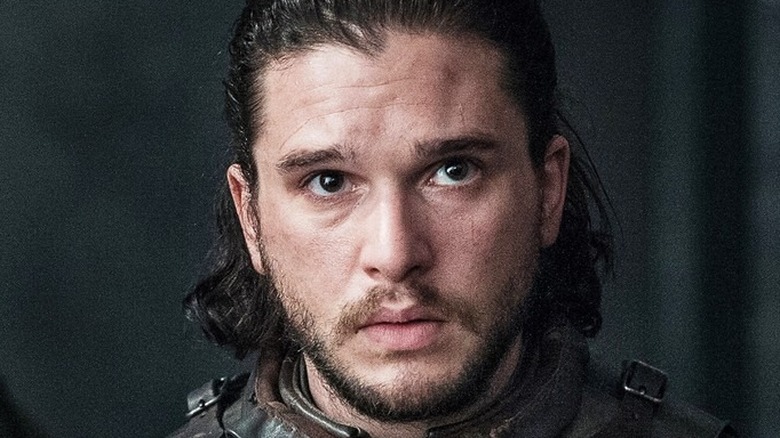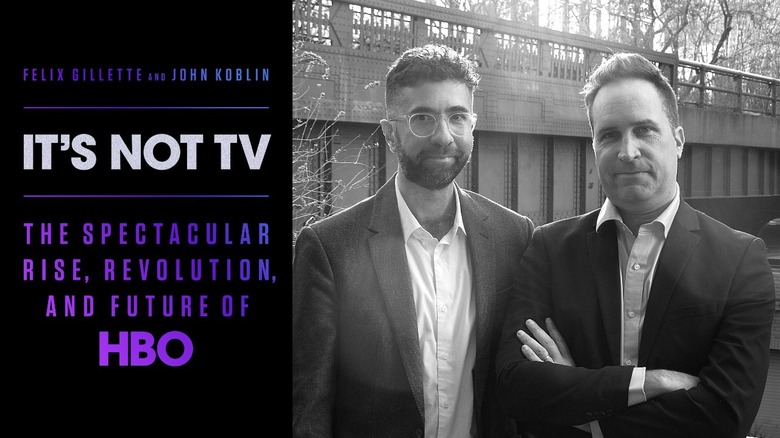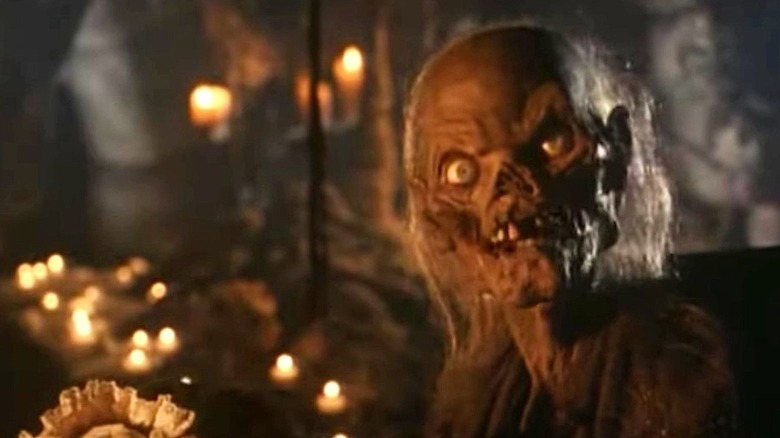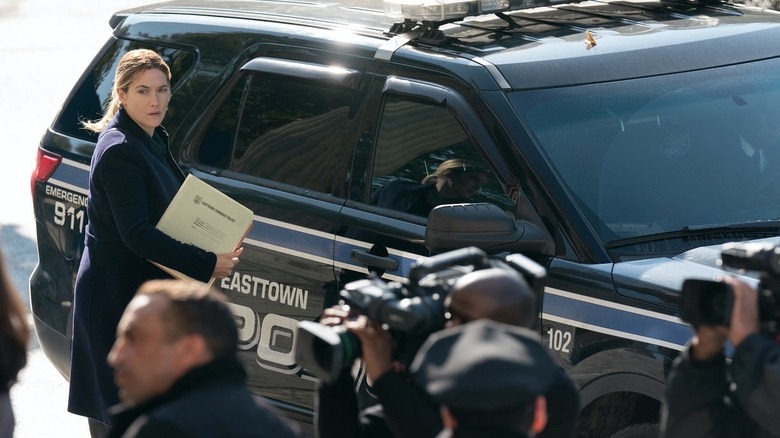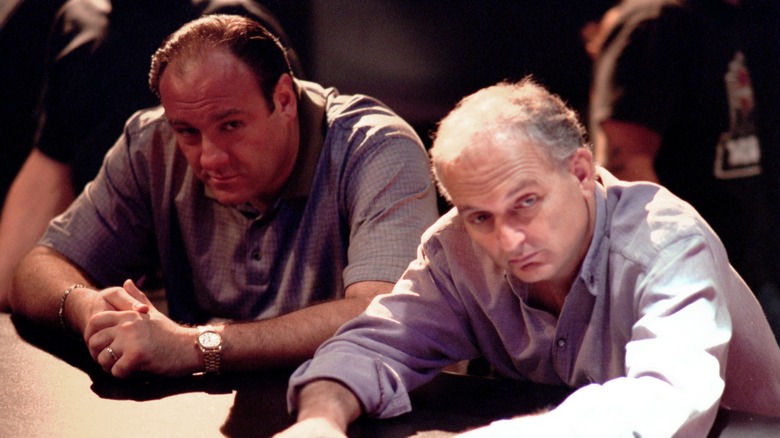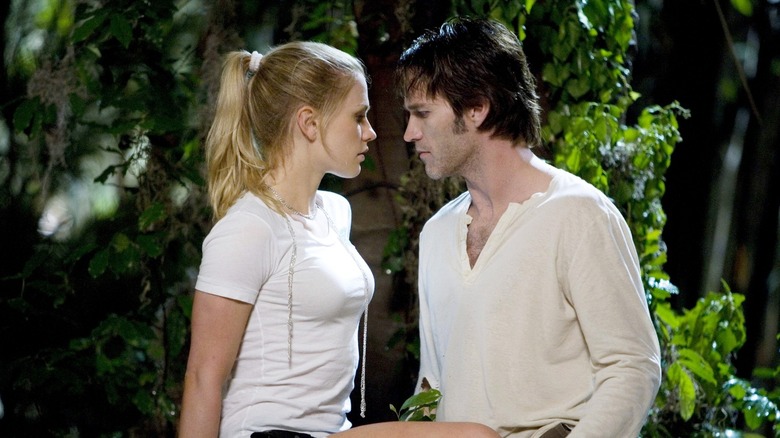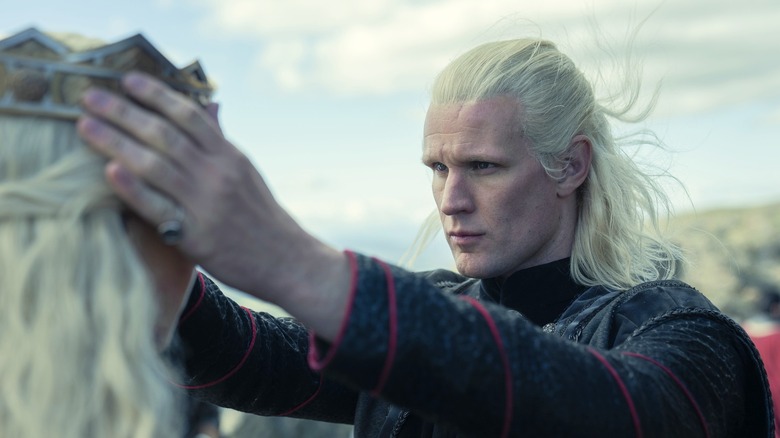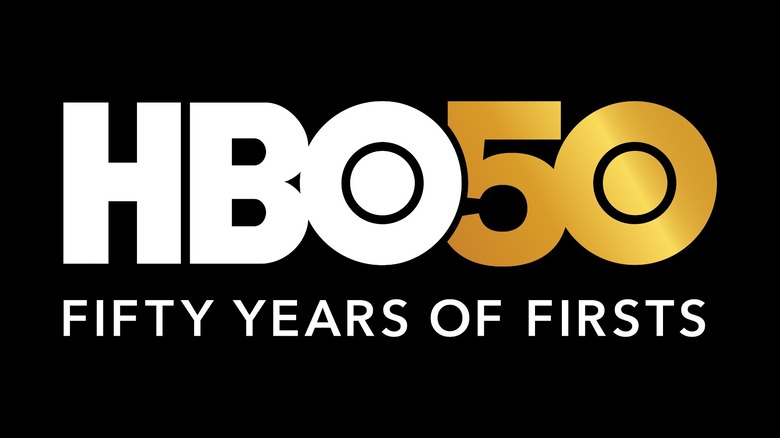It's Not TV Co-Author Felix Gillette On HBO's Complex History And Television Dominance - Exclusive Interview
On November 8, 1972, a small pay television outlet called HBO made its auspicious debut for a mere 365 cable TV subscribers in Wilkes-Barre, Pennsylvania. Over the next 50 years, the company grew exponentially and added several channels to its flagship network — most recently, its HBO Max streaming service — to become the multibillion-dollar media conglomerate that has revolutionized the TV industry.
The change didn't happen overnight. However, once HBO started producing original films and television series and airing high-profile sporting events, as well as music and comedy specials, viewers and the television industry took notice, and the cable network became a legitimate threat to its broadcast network competitors. Along with its streaming service, HBO today is of the most dominant forces on the television landscape.
A success story like HBO's is much more complex than it seems on its face. As such, two veteran business and media journalists — Felix Gillette of Bloomberg News and John Koblin of The New York Times — took on the daunting task of combing through five decades of HBO's existence and chronicled the inner workings of the cable network's meteoric rise and nearly catastrophic falls with their new book "It's Not TV: The Spectacular Rise, Revolution and Future of HBO" (Viking).
In an exclusive interview with Looper, Gillette detailed several of the tales told in "It's Not TV," including how iconic HBO series like "The Sopranos," "Sex and the City," and "Game of Thrones" rose to prominence — and how the media giant tackled filling the void in their absences.
Daring to be different
It seems like there's a consistent theme highlighted in "It's Not TV" that HBO has used since its inception in challenging the traditional broadcast networks, which is to differentiate itself from its competition. There are obviously a lot of factors that determine what makes or breaks a business, but would you consider the whole "let's be different" mindset one of the biggest keys to the success of HBO?
Absolutely huge. Early on, [HBO] realized the broadcast networks in the 1980s were too powerful to go up against head-to-head. They had too much money. They had too much reach. From the beginning when HBO decided, "We're going to start making original programming," they realized [they're] going to have to do it differently than the networks.
One of the things that really gets at HBO's success over the years in programming is that they had to figure out, "What can we offer?" When they decided that we were going to go into making serialized television, making series, they had to think, "What are we offering these TV show creators that they couldn't get from the networks? We can't give them the money. We can't give them the promise of syndication down the road."
They realized, "We can offer you creative freedom," [and that was huge] for veteran TV writers who'd spent years working in broadcast television. [They liked] the idea of not having to worry about commercial sponsors looking over their shoulders and not having tons of notes from the network saying, "Can we make these characters a little bit more likable? Can we make the subtext a little bit clearer?" and not getting that endless, "Just make this ... Can we steer away from that topic? Let's not talk about AIDS. Let's not talk about abortion. Let's not talk about gun control. Let's steer away from those issues."
The idea that you could come to HBO and make a show the way you wanted to make it without all of those rules was really appealing ... [It's like HBO told TV creators], "This is a place where you can throw out all those frustrations and all those things that you've bumped your head up against for years and do a show the way you want to do it."
For example, we talked to Darren Star about creating "Sex and the City" and bringing it to HBO, and at the time, there were really only two bidders for that show. It was ABC and HBO, and they would've gotten a lot more money and a lot bigger audience at the time going with ABC. Instead, he decided, "I want to go to HBO," because he thought of it as an indie little project. It was going to be this tiny little art project that nobody was going to watch, but he would do it his own way and it turns into this enormously successful show and franchise for HBO. Once they hit on that formula, that really carried them to the present day. That's still what they're doing.
The shift in who cancels what
HBO created content that you would not see on broadcast, and it was for "Tales from the Crypt," I believe, when then-CEO Chris Albrecht responded to viewers complaining about the violence by saying, "Cancel your subscription if you don't like it." Today, the irony is that users — if they get a catchy enough hashtag — maybe they're not going to cancel a network the size of HBO but certainly they can do some serious damage in the short term. Has the cancel tide turned in that respect, or do you think HBO can still march forth with their independent mindset?
They still have a lot of leeway. It's a different world in terms of feedback from customers. The thing about HBO that's really unique and different — and we contrast it throughout the book with Netflix — is that in the modern business world, it's very in vogue to say, "Whoever has the best data on their customers is going to have the advantage in business. You sort through the data. You look at customer preferences. You let your algorithm go crazy and you're going to find whatever you need in the next product."
HBO, because it was a wholesaler and didn't deal directly with customers — their customers were always the cable operators, which in turn dealt with the homeowners and the subscribers — they never had any data on their customers. They never knew who was subscribing, and as a result, they had no ability to listen to customers. They couldn't sit back and think, "What do the customers want to watch next? What's the trend?" They couldn't look for those signals. They had to develop this other way, which was based on intuition, experience and finding seasoned artists from television, and giving them leeway and trusting them to have a point of view and to do things differently.
That is the mode that they still operate in ... They don't say to themselves, "'Dahmer's' doing well on Netflix. What could we do in that vein?" They're always looking for something that looks a little bit different ... [Think of] "Game of Thrones," a sci-fi series for HBO with dragons; there wasn't a precedent for it and yet that turned into a huge success for them ... They're pretty used to trusting their own instinct and their own gut feeling on what is going to make good television, and I don't think they're very susceptible to worrying too much about noise in the marketplace and then the data.
Each new series provided a turning point for HBO
As I was going through the book and reading all of the titles you and John Koblin hit upon — From "Dream On," "The Larry Sanders Show," and "Sex and the City" — all the way through "Mare of Easttown" and "Succession," I was looking for a series that provided a huge turning point for HBO. Then I realized — there's a turning point with every single one. There wasn't one definitive turning point. All these shows have something different to offer.
Yeah, they did. Each origin story is fascinating to me. I love hearing from the creators and how the ideas came about, how they took root, how they were supported, and why they connected with viewers. In some macro sense, the really one enormous switch in HBO's history that you can look back at and point at as, "That was crucial to everything else that came later," was that throughout the '70s and the '80s, from its origin, HBO stood for the Home Box Office. The original idea was, "We'll offer you things in your living room that you, before, would have to go out and buy a ticket for." [They said], "We'll give you sporting events like boxing. We'll give you movies that you would have to go and buy a ticket for. We'll give you music concerts. We'll give you standup comedy." That was the programming philosophy for the first couple decades.
They were pretty resistant early on in making series, because the networks created television — and they gave it away for free — and they were very good at doing it. [HBO] avoided doing series for a long time. The biggest, if you had to point to one really enormous moment in HBO's history, it's going back to the mid-'90s when they finally decided, "No matter how popular this Madonna concert is, no matter how popular this Jerry Seinfeld standup comedy performance is, it's one time and then it's done, and it doesn't have the same pull. It doesn't bring people back week after week. If we want to keep these subscribers engaged and we want to keep them holding onto the service that they have to pay extra for every month, we need to start doing these serialized shows." That was really the point where they got serious about making series and putting a lot of money into them.
It happened to coincide also, fortunately for HBO, at that same time there was the new technology coming out with DVDs. That allowed HBO to monetize those shows with the second revenue stream. They were able to spend a lot of money on shows like "The Sopranos" and shoot in the field, doing things outside the studio, having big ensemble casts and putting a lot of money onto the screen. Then, they were able to make that back up on the back end, not just by having subscribers and keeping their subscribers engaged, but also, if you remember those box sets for "The Sopranos"? I still have one down in my basement, really beautiful, the liner notes, all the images of the cast. If you got that, it was $100 for a season! They sold huge amounts of those things, and it was like printing money for them with a hit series.
How the tide turned on broadcast networks with The Sopranos
On top of being able to monetize "The Sopranos" because the show was a big awards winner, would you consider it the HBO show that put the broadcast networks out to pasture? Sure, HBO shows won winning Emmys before the series, but "The Sopranos" came in and dominated the top categories. If there was one big turning point, maybe "The Sopranos" provided it?
It was a huge turning point, because that was so massively popular. It was event television. It was something that dominated the water cooler talk. It was the first show on HBO that drove the broadcast networks executives crazy with jealousy, that they were like, "We want that, and we can't do it. We can't have that level of violence. We can't have that level of intensity. The characters are so rich and different." They saw it happening and they realized, "Wow, the tide is really changing."
It was an incredible series, critically, so beloved by fans, racked up so many awards, sold so many DVDs, and that was one of the biggest moments in HBO history. In the book, we get into how almost lucky it was that it ended up on HBO, because originally, David Chase sold the idea to Fox. He wrote a couple scripts. They decided, "Nah, it's not"—
Nobody wanted a show about a mobster seeing a psychiatrist, except the head of HBO had the foresight to say, "I like this."
[Yes, he said], "That's actually interesting. We want to do that." That stuff is fun. At some point, the production company, Brillstein-Grey, they also had a management side of their company. Early in the development, when Fox was basically getting cold feet, they said, "Hey, you know what? We can offer Jim Belushi as the lead." They would've [cast him as] Tony Soprano.
I love Jim Belushi, but come on!
I know. It's very funny to think of a world in which "The Sopranos" was on Fox with Jim Belushi. That didn't happen and James Gandolfini got the role, and we recall that story also in the book. David Chase, of all the people I talked to for the book, of the hundreds of interviews we did, he is an amazing person to talk to. It was so much fun to hear his memories of the show and how it got started.
True Blood provided the new blood HBO needed after The Sopranos
"The Sopranos" left a huge void after it ended, so would you say "Game of Thrones" was the show to fill it? They are set in two completely different time periods, but there's no question there are general similarities in the shows in terms of violence, sex, the perils of power, the characters, etc.
That was their next megahit, but if anything, there was a stepping stone in there. "True Blood" was important for HBO because that was a popular show for HBO at a time when they really needed something after the end of "The Sopranos." They had a couple dramas completely flop: "John from Cincinnati," most famously, and then "True Blood" hit. It was also important because "True Blood" proved that HBO could do a genre show — a sci-fi show, and people would show up in big numbers to watch it. They hadn't really done anything in that category since "Tales from the Crypt." There was a lot of skepticism in the development process with "True Blood," like, "Does this really feel like an HBO show? Is this going to work?"
When "True Blood" hit and was popular, that paved the way for "Game of Thrones." HBO said, "We can work in this sci-fi world. We can make it in an HBO way." It was the first thing that topped "The Sopranos" in terms of its impact on the culture and its popularity, its ability to travel overseas, get viewers all around the world, and be a crazy, huge, pop phenomenon.
How big a game HBO play with the Thrones franchise?
"Game of Thrones" provided the perfect storm for HBO by creating this cross section of prestige TV and an IP that's really akin to the Marvel Cinematic Universe and the "Star Wars" universe. With more "Game of Thrones" spinoff shows on the way, does HBO run the risk of losing its way and becoming more like studios trying to tame a massive beast? "House of the Dragon" is off to a great start ratings-wise, but many don't think the quality of the show is as good as "Game of Thrones."
It's a great question. In the past, one thing HBO has never done very well was to expand their hit series into spinoffs, and they've tried over the years. The "Sex and the City" movies were commercially, fairly successful, but critically, panned for the most part. The "Entourage" movie was a disaster. The "Deadwood" movie was not amazing. Even "The Sopranos" movie, "The Many Saints of Newark," was not as good as the original series. It's a trick they've tried a bunch of times in the past. "House of the Dragon" is the first time they've done a spinoff, prequel, [etc.] that has had a lot of popularity, which delivered a big audience.
In some ways, though, there is that concern where you're like, "Is that the future?" ... It's an additional skill in the HBO playbook that they're working on. I don't think they're ever going to rely entirely on rebooting an IP. They're never going to become Disney. That's the trick that Disney does better than anybody. For HBO in this next phase of the streaming wars, a lot of the competition is going to be not just here in the United States — where HBO has an incredibly strong brand — but they're going to need to go overseas. They're going to need to succeed in Europe, Asia, and Latin America, and to do that, it's very promising that they can take a show like 'Game of Thrones,' which did have a big overseas following, and create another series. Sci-fi stuff travels well across cultures. It's an important trick for them to master.
Taking a step back, this fall was, in some ways, a blockbuster era of streaming because you had not just "House of the Dragon" on HBO, but you also had the "Lord of the Rings" series ["The Rings of Power"] on Amazon, which is [incredibly expensive, costing nearly $500 million in production]. You had sci-fi series on Netflix like "Sandman." You had "She-Hulk" on Disney+. All of these really big, lavish, expensive series have seemingly performed pretty well.
You do wonder at some level, if those shows succeed so much, are we going to start seeing the same thing from these streaming services that we've seen over the past 20 years in the theatrical distribution, where the big sci-fi comic book-based movies have crowded out a lot of the more niche in the adult fare? I don't see too much evidence of that yet, but it's a good question to ask.
The next chapter of HBO
You mentioned Warner Bros. Discovery CEO David Zaslav at the end of the book, and if you and John Koblin had more time to write "It's Not TV," I'm sure you would have detailed the budget-slashing bloodbath that continues to flow under the cuts the corporation made to HBO Max and other properties under their umbrella — including the unprecedented cancellation of the nearly-completed "Batgirl" movie. Are such deep cuts the way of the entertainment business now?
In the short term, yes. [Given] the nature of the deal and how much debt Warner Bros. Discovery has, there's going to be a lot of pressure to cost cut in the near term. They're going to be looking for projects to shelve and get rid of. In the long term, they're committed, and they have to, basically, spend a huge amount of programming to keep up with Netflix, to keep up with [all of their competitors]. Amazon is doubling down on their spending. They're getting NFL football games. They're making the "Lord of the Rings" series. Apple is coming in and spending money in this space.
This is not a world in which you can cut your way to success, and Zaslav realizes that. There is tension there, because Discovery — the business that he's been running for decades — what they do at Discovery is low-cost reality programming, and they're not used to spending $100 million on a series. That's a different level, and it requires a different level of comfort. He'll get there and I'm not overly concerned.
In the long term, when you look at HBO, Casey Bloys, who's now overseeing programming for HBO and HBO Max, he came up through the development ranks at HBO. He has a lot of talented executives working underneath him. They have a big budget. They have a big mandate to keep creating these big shows. I don't see any real signs of concern there as far as the HBO goes.
Authors Felix Gillette and John Koblin's book "It's Not TV: The Spectacular Rise, Revolution, and Future of HBO" is new in stores and online from Viking Press.
This interview was edited for length and clarity.
